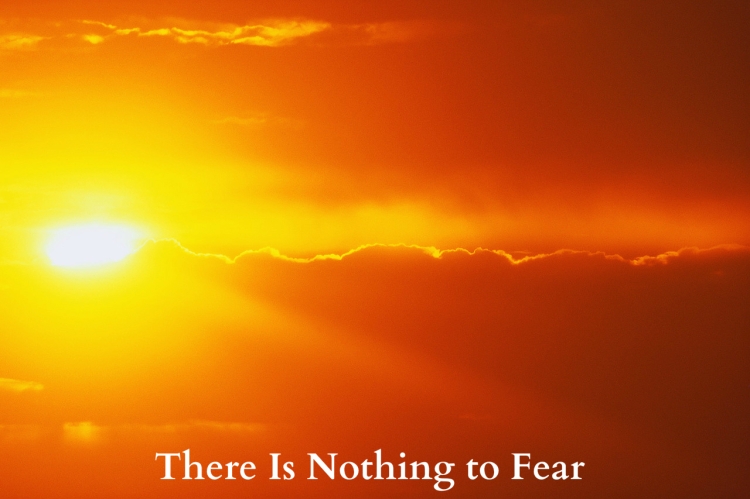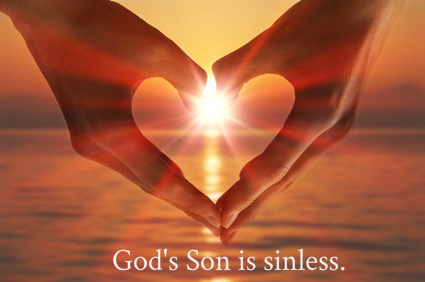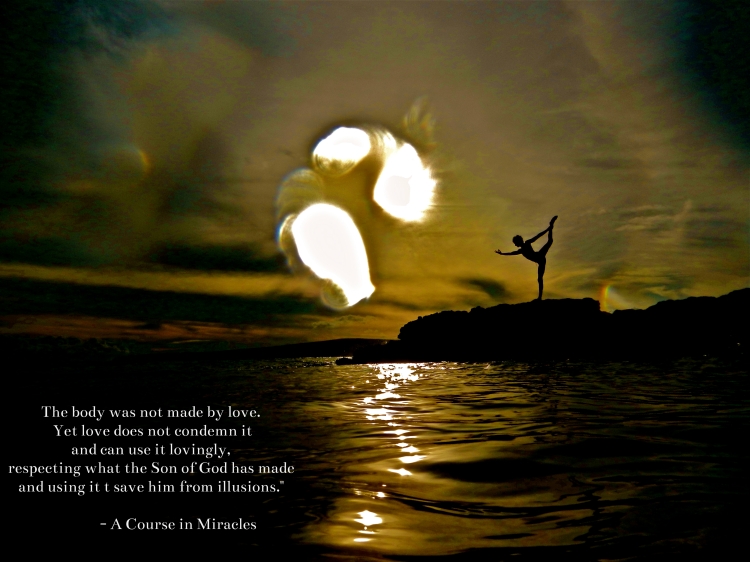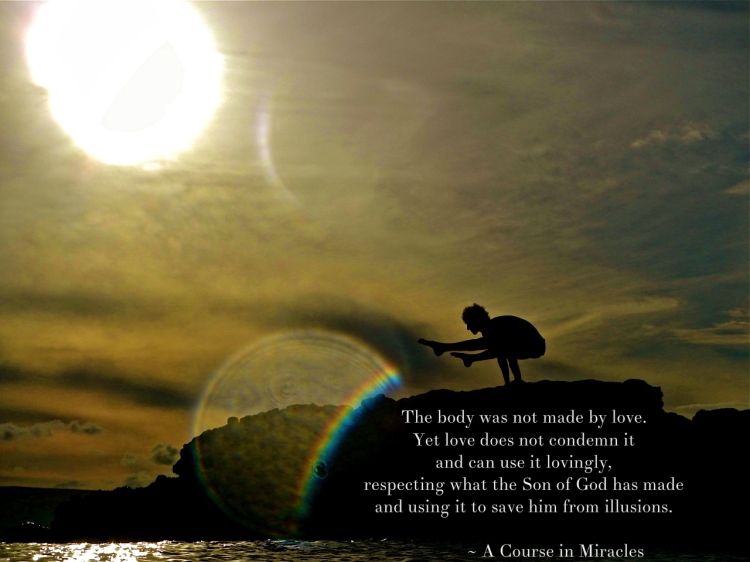ACIM Text Reading for June 20
Chapter 20 ~ The Vision of Holiness
I. Holy Week
This is Palm Sunday, the celebration of victory and the acceptance of the truth. Let us not spend this holy week brooding on the crucifixion of God’s Son, but happily in the celebration of his release. For Easter is the sign of peace, not pain. A slain Christ has no meaning. But a risen Christ becomes the symbol of the Son of God’s forgiveness on himself; the sign he looks upon himself as healed and whole.
This week begins with palms and ends with lilies, the white and holy sign the Son of God is innocent. Let no dark sign of crucifixion intervene between the journey and its purpose; between the acceptance of the truth and its expression. This week we celebrate life, not death. And we honour the perfect purity of the Son of God, and not his sins. Offer your brother the gift of lilies, not the crown of thorns; the gift of love and not the ‘gift’ of fear. You stand beside your brother, thorns in one hand and lilies in the other, uncertain which to give. Join now with me and throw away the thorns, offering the lilies to replace them. This Easter I would have the gift of your forgiveness offered by you to me, and returned by me to you. We cannot be united in crucifixion and in death. Nor can the resurrection be complete till your forgiveness rests on Christ, along with mine.
A week is short, and yet this holy week is the symbol of the whole journey the Son of God has undertaken. He started with the sign of victory, the promise of the resurrection, already given him. Let him not wander into the temptation of crucifixion, and delay him there. Help him to go in peace beyond it, with the light of his own innocence lighting his way to his redemption and release. Hold him not back with thorns and nails when his redemption is so near. But let the whiteness of your shining gift of lilies speed him on his way to resurrection.
Easter is not the celebration of the cost of sin but of its end. If you see glimpses of the face of Christ behind the veil, looking between the snow white petals of the lilies you have received and given as your gift, you will behold your brother’s face and recognise it. I was a stranger and you took me in, not knowing who I was. Yet for your gift of lilies you will know. In your forgiveness of this stranger, alien to you and yet your ancient Friend, lies his release and your redemption with him. The time of Easter is a time of joy, and not of mourning. Look on your risen Friend, and celebrate his holiness along with me. For Easter is the time of your salvation, along with mine.
For a Free Downloadable Audio of Today’s Text Reading, Click HERE
***
ACIM Workbook Lesson for June 20
Lesson 171
REVIEW V
Introduction
We now review again. This time we are ready to give more effort and more time to what we undertake. We recognize we are preparing for another phase of understanding. We would take this step completely, that we may go on again more certain, more sincere, with faith upheld more surely. Our footsteps have not been unwavering, and doubts have made us walk uncertainly and slowly on the road this course sets forth. But now we hasten on, for we approach a greater certainty, a firmer purpose and a surer goal.
Steady our feet, our Father. Let our doubts be quiet and our holy minds be still, and speak to us. We have no words to give to You. We would but listen to Your Word, and make it ours. Lead our practicing as does a father lead a little child along a way he does not understand. Yet does he follow, sure that he is safe because his father leads the way for him.
So do we bring our practicing to You. And if we stumble, You will raise us up. If we forget the way, we count upon Your sure remembering. We wander off, but You will not forget to call us back. Quicken our footsteps now, that we may walk more certainly and quickly unto You. And we accept the Word You offer us to unify our practicing, as we review the thoughts that You have given us.
This is the thought which should precede the thoughts that we review. Each one but clarifies some aspect of this thought, or helps it be more meaningful, more personal and true, and more descriptive of the holy Self we share and now prepare to know again:
God is but Love, and therefore so am I.
This Self alone knows Love. This Self alone is perfectly consistent in Its Thoughts; knows Its Creator, understands Itself, is perfect in Its knowledge and Its Love, and never changes from Its constant state of union with Its Father and Itself.
And it is this that waits to meet us at the journey’s ending. Every step we take brings us a little nearer. This review will shorten time immeasurably, if we keep in mind that this remains our goal, and as we practice it is this to which we are approaching. Let us raise our hearts from dust to life, as we remember this is promised us, and that this course was sent to open up the path of light to us, and teach us, step by step, how to return to the eternal Self we thought we lost.
I take the journey with you. For I share your doubts and fears a little while, that you may come to me who recognize the road by which all fears and doubts are overcome. We walk together. I must understand uncertainty and pain, although I know they have no meaning. Yet a savior must remain with those he teaches, seeing what they see, but still retaining in his mind the way that led him out, and now will lead you out with him. God’s Son is crucified until you walk along the road with me.
My resurrection comes again each time I lead a brother safely to the place at which the journey ends and is forgot. I am renewed each time a brother learns there is a way from misery and pain. I am reborn each time a brother’s mind turns to the light in him and looks for me. I have forgotten no one. Help me now to lead you back to where the journey was begun, to make another choice with me.
Release me as you practice once again the thoughts I brought to you from Him Who sees your bitter need, and knows the answer God has given Him. Together we review these thoughts. Together we devote our time and effort to them. And together we will teach them to our brothers. God would not have Heaven incomplete. It waits for you, as I do. I am incomplete without your part in me. And as I am made whole we go together to our ancient home, prepared for us before time was and kept unchanged by time, immaculate and safe, as it will be at last when time is done.
Let this review be then your gift to me. For this alone I need; that you will hear the words I speak, and give them to the world. You are my voice, my eyes, my feet, my hands through which I save the world. The Self from which I call to you is but your own. To Him we go together. Take your brother’s hand, for this is not a way we walk alone. In him I walk with you, and you with me. Our Father wills His Son be one with Him. What lives but must not then be one with you?
Let this review become a time in which we share a new experience for you, yet one as old as time and older still. Hallowed your Name. Your glory undefiled forever. And your wholeness now complete, as God established it. You are His Son, completing His extension in your own. We practice but an ancient truth we knew before illusion seemed to claim the world. And we remind the world that it is free of all illusions every time we say:
God is but Love, and therefore so am I.
With this we start each day of our review. With this we start and end each period of practice time. And with this thought we sleep, to waken once again with these same words upon our lips, to greet another day. No thought that we review but we surround with it, and use the thoughts to hold it up before our minds, and keep it clear in our rememberance throughout the day. And thus, when we have finished this review, we will have recognized the words we speak are true.
Yet are the words but aids, and to be used, except at the beginning and the end of practice periods, but to recall the mind, as needed, to its purpose. We place faith in the experience that comes from practice, not the means we use. We wait for the experience, and recognize that it is only here conviction lies. We use the words, and try and try again to go beyond them to their meaning, which is far beyond their sound. The sound grows dim and disappears, as we approach the Source of meaning. It is Here that we find rest.
***
Lesson 171
God is but Love, and therefore so am I.
(151) All things are echoes of the Voice for God.
God is but Love, and therefore so am I.
(152) The power of decision is my own.
God is but Love, and therefore so am I.
For a Free Downloadable Audio of Today’s Workbook Lesson, Click HERE
***
ACIM Q & A for Today
Q #397: My question relates to a sense I have that we have reached a critical mass and are on the rush side of salvation. Though we may have had millions of years to go, from the contribution of A Course in Miracles alone, I think of all the people, since the book was published, who have done the lessons, which, if I remember correctly, can save a thousand years.
I think maybe we are much further than we might think because of this theory: For a single act of malice (which we can assume was initiated by a thought of separation) there are hundreds of simple acts (and thoughts) of kindness, such as smiles and opening of doors and so forth. In order to keep the illusory world alive, our egos feed on stories, whether they are reported in the press or shared at home or in the workplace as gossip, which amplify the one act of malice. Almost everyone who hears of the negative story responds with a separating thought, thus amplifying the negativity. If we have, in fact, awakened appreciably, might this explain why the press has grown in its coverage and lunacy? How simple salvation might be now. How helpful to simply abstain from gossip, personal and press. What do you think?
A: An interesting idea, but there are some assumptions you are making, which you may wish to consider. For one, you may be overestimating the ratio of acts and thoughts of kindness to malicious acts. Every thought of irritation, frustration, annoyance, exasperation, etc., no matter how trivial and seemingly neutralized by covering it over with a smile and a nice word or two, shares the same content as the act of malice you mention that gets all the air time. And how many of those “minor” ego attacks do we each experience in a day, if we are honest with ourselves? Remember, there is no hierarchy of illusions — all are equal in their power to deprive us of our peace.
In addition, it is a common belief — but not the Course’s position — that a major obstacle to the experience of peace is any expression of negativity or attack thoughts, by oneself or by anyone else. And therefore anything that perpetuates the awareness of the negativity, such as the media or personal gossip, is contributing to and magnifying the problem. But the negativity is not simply generated by hearing or repeating gossip or reacting to reported acts of violence in the news. These are only outpicturings of the negativity buried in the mind that has been there all along and remains there until a deliberate choice is made against the ego thought system and for the Holy Spirit. That is the real problem. As such, if looked at with the Holy Spirit, these expressions of negativity and our reactions to them can actually serve a helpful purpose in healing the mind.
The problem is never the specific expression but its purpose. And expressions of negativity reflect the desire to project the guilt within our minds onto someone else. What needs to be changed are not the external expressions of negativity but the inner decision to keep one’s own guilt real but hidden by projecting it on to others. Stopping the external expression of attack, or avoiding exposing oneself to others’ expressions of negativity, will accomplish nothing if the inner guilt that motivates the projection is not acknowledged and released to the Holy Spirit. Changing the external form without recognizing what is behind it only pushes the guilt deeper into the unconscious, where it continues to have unconscious effects, perhaps in the form then of illness or extreme rage when it is finally projected, as it must be so long as it is denied. The negativity exists in the mind and the external event merely elicits it out from under the veils of denial. It may be helpful to remember that a healed mind has no reaction to the so-called negativity of the world, whatever form it may take, because it has no guilt within that it needs to project.
Now there is certainly nothing wrong with abstaining from gossip, especially once we understand the hateful purpose it serves. For gossip reinforces the ego’s hidden reservoir of guilt. But again, merely curbing the activity without a corresponding inner shift that chooses against the ego, which always looks to see the guilt outside the mind in others, does not undo the guilt that lies buried there. If I find myself in judgment of the media or the gossiper, I have accepted the same ego purpose.
And finally, your opening comments suggest there is a kind of momentum that builds as more and more people embrace the Course and practice forgiveness. There can be a kind of wishful thinking behind this idea, almost as if I will not have to make the choice, moment by moment, against my ego and for the Holy Spirit, because the collective mind is going to bring me and everyone else along in the inevitable flood of forgiveness. And the special danger here is that we will underestimate the wiliness and the tenacity of the ego and overlook the subtle ways in which it continues to keep itself alive through reinforcing specialness and separation, albeit in seemingly more acceptable “spiritual” forms. My only responsibility, as the Course reminds us repeatedly, is to accept the Atonement for myself. So long as the guilt over separation remains real in my own mind, that is the only thing I need be concerned about. For, as Jesus reminds us, only one teacher of God — myself — is needed to save the world (M.12).





